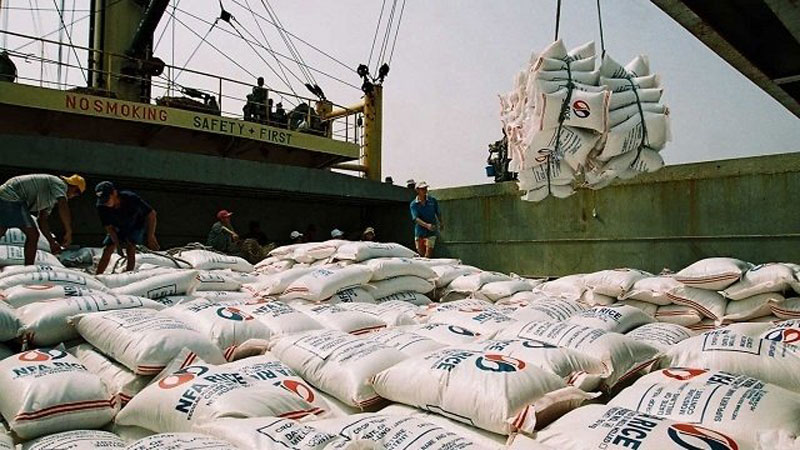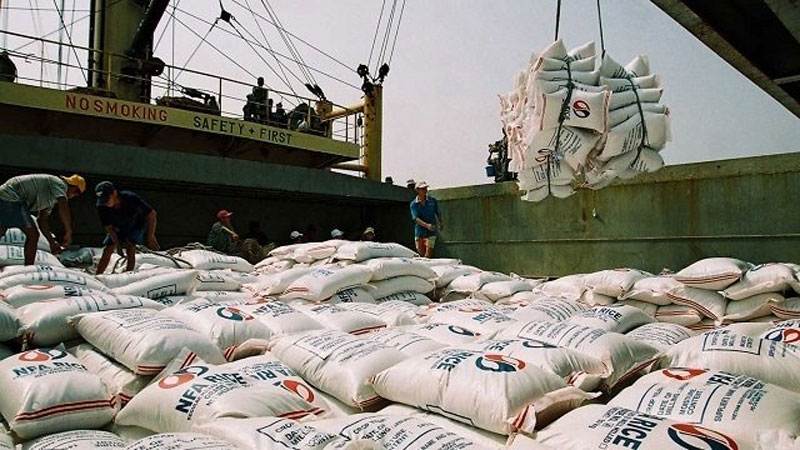
According to the Ministry of Agriculture and Rural Development, in the first quarter of 2019, Vietnam's rice export volume was estimated at 1.43 million tonnes, worth US$ 593 million, down 3.5% in volume and 20.2% in value over the same period in 2018.

Illustrative
image.
The average
export price of rice in the first two months of the year only reached US$404
per tonne, down 17.8% compared to the same period in 2018. Difficulties in
exporting rice in the first quarter have dragged down the price of rice in the
Mekong Delta, especially in February, 2019, when entering the harvest of
winter-spring rice.
Part of the reason for the decline in the volume
of exported rice is due to the fact that the first few months of the year
coincide with the Lunar New Year, plus domestic enterprises have not promoted
delivery and traders who buy rice have not begun to trade yet. On the market
side, in the early months of 2019, some countries still have surplus rice from
2018, so they have no demand for import which in turn makes the market less
active.
In addition, China, one of Vietnam's major rice
import markets for many years, has now reduced their rice purchases, which has
had a relatively large impact. At the same time, measures to closely control
food safety and hygiene for imported rice have been strengthened and there are
more stringent regulations on the supervision and management of imported goods.
Until now, only 21 Vietnamese enterprises are allowed to export rice to the
Chinese market. The reduction of export indications has led to a sharp decline
in rice export volume.
For other traditional markets such as the
Philippines and Indonesia, Vietnam is also facing difficulties in boosting rice
exports to these markets. Specifically, the Philippines is seeking to expand
its rice supply by signing more memorandums of cooperation with Pakistan and
Myanmar. Meanwhile, Indonesia has also restricted imports because the country's
reserved rice is still sufficient until the end of the second quarter of 2019.
Facing the above situation, it is necessary to
strengthen solutions to maintain traditional markets and penetrate new markets.
Specially, it is necessary to pay attention to exporting high quality rice and
specialty rice instead of white rice as before.
In addition, localities need to accelerate the
effective implementation of the restructuring scheme of the rice industry,
because the competition for rice quality is becoming a real "war"
when the rice of some other countries in the region are constantly increasing
competition for Vietnamese rice in terms of quality, value and ways of
promoting their image. Therefore, in addition to improving quality,
strengthening the promotion of rice trade in markets, and the promotion and
image building for Vietnamese rice also are very important, therefore businesses
and authorities should pay greater attention to these requirements. After
building an image of high quality rice seeds with competitive prices, the
export to fastidious markets will certainly become more open, creating new
markets to stabilise the volume and turnover value.
Source: NDO
According to data from the Hoa Binh Provincial Party Committee, the industrial production index for the first six months of 2025 is estimated to have increased by 20% compared to the same period last year. This marks the highest year-on-year growth rate for this period since 2020.
In the first six months of 2025, Hoa Binh province’s export turnover was estimated at 1.145 billion USD, marking an 18.11% increase compared to the same period in 2024. Import turnover was estimated at $ 804 million, a 17.15% increase, which helped the province maintain a positive trade balance.
The lives of the ethnic minority farmers in Tan Lac district have gradually improved thanks to the new directions in agricultural production. This is a testament to the collective strength fostered through the professional associations and groups implemented by various levels of the district’s Farmers’ Union.
With the motto the "product quality comes first,” after nearly one year of establishment and operation, Muong village’s Clean Food Agricultural and Commercial Cooperative, located in Cau Hamlet, Hung Son Commune (Kim Boi district), has launched reputable, high-quality agricultural products to the market that are well-received by consumers. The products such as Muong village’s pork sausage, salt-cured chicken, and salt-cured pork hocks have gradually carved out a place in the market and they are on the path to obtaining the OCOP certification.
In the past, the phrase "bumper harvest, rock-bottom prices" was a familiar refrain for Vietnamese farmers engaged in fragmented, small-scale agriculture. But today, a new spirit is emerging across rural areas of Hoa Binh province - one of collaboration, organisation, and collective economic models that provide a stable foundation for production.
Maintaining growing area codes and packing facility codes in accordance with regulations is a mandatory requirement for agricultural products to be eligible for export. Recently, the Department of Agriculture and Environment of Hoa Binh province has intensified technical supervision of designated farming areas and packing facilities to safeguard the "green passport" that enables its products to access international markets.



